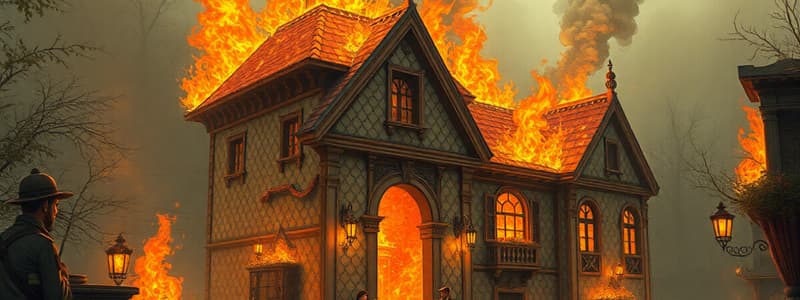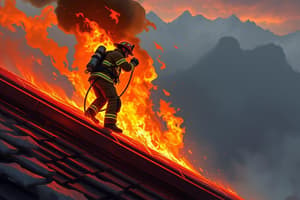Podcast
Questions and Answers
What is the primary consideration for hose line placement during an incident?
What is the primary consideration for hose line placement during an incident?
- Equipment accessibility
- Life safety (correct)
- Property conservation
- Incident stabilization
Which of the following is NOT included as a factor that affects the effectiveness of hose lines?
Which of the following is NOT included as a factor that affects the effectiveness of hose lines?
- Size
- Mobility
- Speed
- Water pressure (correct)
What is the responsibility of each engine company regarding the water supply?
What is the responsibility of each engine company regarding the water supply?
- Notify the Incident Commander of water supply status
- Lay a line to the nearest water source
- Share water source with other engine companies
- Assure an uninterrupted water supply by any appropriate means (correct)
Which support activity assists in active fire control and rescue operations?
Which support activity assists in active fire control and rescue operations?
What should be done promptly after forcing a door to prevent the fire from growing out of control?
What should be done promptly after forcing a door to prevent the fire from growing out of control?
What could indicate a ventilation-limited fire after opening a door?
What could indicate a ventilation-limited fire after opening a door?
Why is it important to control new ventilation openings?
Why is it important to control new ventilation openings?
What should be considered regarding ventilation openings in commercial structures?
What should be considered regarding ventilation openings in commercial structures?
What is a potential consequence of vertical ventilation if not properly coordinated?
What is a potential consequence of vertical ventilation if not properly coordinated?
What happens when a window or door is opened on the windward side of a building during a fire?
What happens when a window or door is opened on the windward side of a building during a fire?
What is the recommended position for personnel during a fire attack in windy conditions?
What is the recommended position for personnel during a fire attack in windy conditions?
When should positive pressure ventilation be coordinated?
When should positive pressure ventilation be coordinated?
What does VEIS stand for, and why is it utilized?
What does VEIS stand for, and why is it utilized?
Which action should be avoided during the VEIS tactic to minimize fire spread?
Which action should be avoided during the VEIS tactic to minimize fire spread?
What is the primary purpose of the ventilation procedures outlined in the document?
What is the primary purpose of the ventilation procedures outlined in the document?
How does opening a door or window affect a ventilation-limited fire?
How does opening a door or window affect a ventilation-limited fire?
What are key factors affecting fire growth and development in terms of ventilation?
What are key factors affecting fire growth and development in terms of ventilation?
What is the guiding principle when performing any ventilation operations?
What is the guiding principle when performing any ventilation operations?
What effect does enlarging or creating ventilation openings have on a fire?
What effect does enlarging or creating ventilation openings have on a fire?
How can controlling the fire flow path influence fire conditions?
How can controlling the fire flow path influence fire conditions?
What is a possible negative consequence of uncontrolled forcible entry during firefighting operations?
What is a possible negative consequence of uncontrolled forcible entry during firefighting operations?
What should firefighters consider before making any ventilation openings?
What should firefighters consider before making any ventilation openings?
Flashcards are hidden until you start studying
Study Notes
Fire Stream Management
- Fire stream management techniques are defined in this SOP
- Life safety is the top priority when deploying hose lines.
- Incident stabilization and property conservation follow life safety considerations.
- Hose lines should be advanced inside fire buildings to control access to halls, stairways, or other vertical and horizontal channels
- It is the responsibility of each engine company to ensure an uninterrupted, adequate supply of water
- Hose line effectiveness depends on size, placement, speed, mobility, and supply
Ventilation Considerations
- Ventilation decisions significantly impact fireground operations
- Fire growth and development are influenced by air entering and exiting the fire area
- Ventilation openings should be controlled and coordinated with the fire attack
- Uncontrolled forcible entry may lead to firefighter or civilian injury, death, and property loss
- Ventilation should be performed with a purpose, considering the impact of actions
Flow Path
- The flow path is the movement of fire through a structure, determined by inlet and exhaust vents for air
- Increasing ventilation openings can lead to fire growth and spread
- Limiting or controlling openings can limit fire growth
- Keeping doors closed helps limit oxygen and reduces fire temperature
- Each new ventilation opening creates a new flow path, potentially leading to dangerous conditions for firefighters
Horizontal Ventilation
- Forcing entry should be treated as ventilation
- Initial ventilation should involve assessing airflow for ventilation-limited fires.
- Each new opening can result in hazardous conditions if placed between the fire and its spread path
- Fire showing does not always indicate sufficient ventilation
- Horizontal ventilation should coincide with water application
- Commercial buildings may require horizontal openings for egress and ventilation, requiring consideration for their impact
Vertical Ventilation
- Vertical ventilation is a natural method for exhausting heated gases but can also create a potential for air uptake
- Vertical ventilation accelerates airflow and can spread fire along the flow path, increasing growth
- Coordination with the fire attack is crucial
- Avoid working over truss roof systems damaged by fire unless inspected and deemed safe
Wind-Driven Fires
- Wind can significantly impact the flow path
- Windward side ventilation can introduce massive amounts of oxygen into a fire, leading to rapid growth and flow path shifts
- Fire attack and ventilation should consider wind direction, keeping it at your back during attack, and limiting ventilation to the leeward side
Positive Pressure Ventilation
- Positive pressure ventilation is coordinated by the Incident Commander
- Positive pressure ventilation should never occur before the 'water on the fire' benchmark.
Vent, Enter, Isolate, Search (VEIS)
- VEIS is effective for potential victims accessible via windows
- When performing VEIS, minimize flow path creation and drawing fire towards victims
- Avoid venting the window with the ladder, and delay venting the entry window until entry
- Upon entrance
- Upon entry to the room, immediately control the door (flow path)
Studying That Suits You
Use AI to generate personalized quizzes and flashcards to suit your learning preferences.




